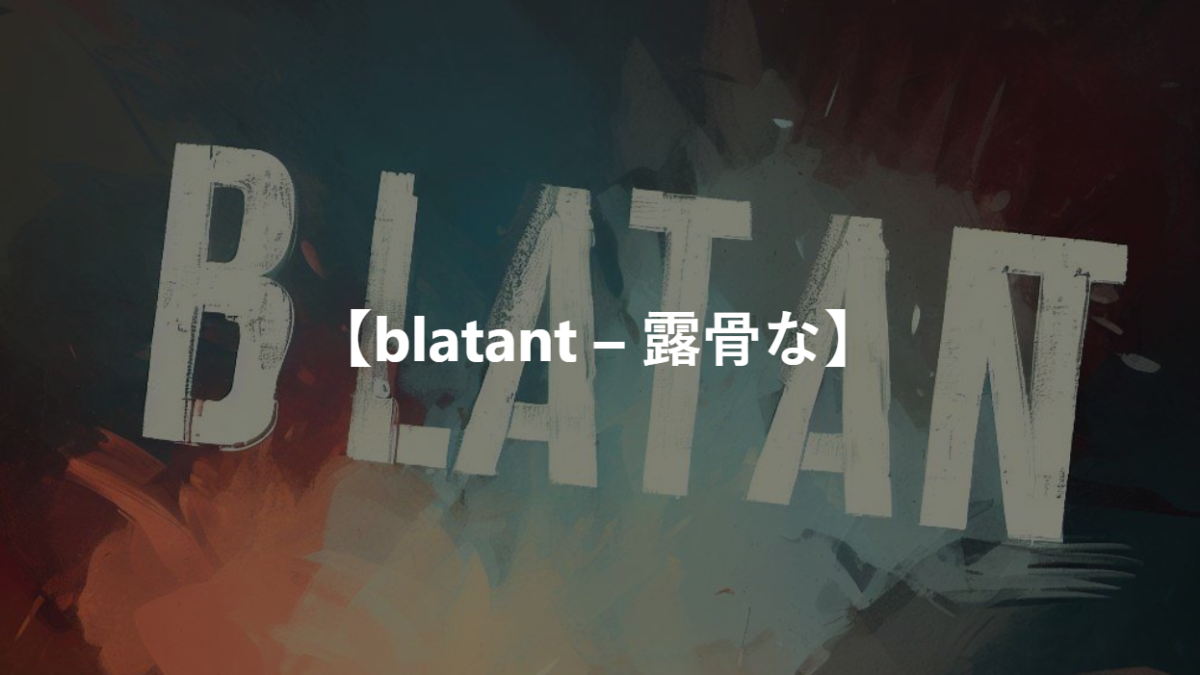語源・類義語・反対語・例文
【Blatant – 露骨な】という単語の語源とか由来を知っていますか?
「Blatant」は、特に16世紀にスペンサーの詩「妖精の女王」で使われた後に英語に定着した言葉です。この単語は、もともとは架空の怪物「Blatant Beast」を指すために作られました。その怪物は、中傷や中傷者を象徴していたとされ、その後「露骨な」や「騒々しい」といった意味で広く使われるようになりました。「Blatant」の語源は完全に明確ではないですが、ラテン語の「blaterare」(饒舌な、おしゃべりな)に関連すると考えられています。時間が経つにつれて、「露骨に不快」や「目立って不適切」などの意味合いで使われるようになり、現在では何かが明らかに、そしてしばしば不快な方法で明示される様子を指すのに用いられます。
The word “blatant” became established in the English language, particularly after its use in Spenser’s poem “The Faerie Queene” in the 16th century. Originally, it was created to denote a fictional monster called the “Blatant Beast,” which symbolized slander or slanderers. The exact origins of “blatant” are not entirely clear, but it is thought to be related to the Latin “blaterare,” meaning “to babble” or “to talk nonsensically.” Over time, the word came to be widely used to describe something “offensively conspicuous” or “noisily obtrusive,” and today, it is used to refer to something that is conspicuously and often disagreeably obvious.
この単語の類義語・反対語を教えてください。
類義語
- Flagrant: 露骨な、目に余る。法や道徳に反する行為が明白である場合に使われます。
- Obvious: 明らかな。何かが容易に理解または認識できることを指します。
- Overt: 公然の。隠されていない、公にされている行為や態度を表します。
- Undisguised: 偽装されていない、隠されていない。何かが隠すことなく直接示されている状態です。
- Conspicuous: 目立つ、顕著な。注意を引くほどに明らかな特徴や行動。
反対語
- Subtle: 微妙な、巧妙な。詳細や違いがわかりにくい、洗練されているかのように見える特徴や行動。
- Covert: 秘密の、隠れた。表面上は見えない、隠された方法や意図。
- Inconspicuous: 目立たない、目に付かない。注意を引かないほど控えめや隠れた状態。
- Unobtrusive: 控えめな、目立たない。周囲と調和していて、特に注目されない特徴や行動。
- Discreet: 慎重な、控えめな。行動や発言が周囲に配慮して行われること。
この単語に似た単語で間違いやすい単語はありますか?
- Flagrant: 通常は「法や道徳に反する行為が露骨である」という文脈で使われます。例えば、「flagrant violation」(目に余る違反)などの表現で見られます。非常に悪質な行為を指す際によく使用されます。
- Patent: 「明らかな」、「疑いようのない」という意味があり、主に発明やアイデアの独自性を保護する特許の文脈で使用されますが、「patent falsehood」(明白な虚偽)など、明らかで疑いようのない状態を指す際にも使われます。
この単語を使った例文を5つほど教えてください。
His blatant disregard for the rules was evident to everyone in the room.
(彼のルール無視は、部屋の誰にでも明らかでした。)
The company’s blatant attempt to deceive its customers resulted in a loss of trust.
(企業の顧客を欺く明白な試みは、信頼の喪失につながりました。)
The politician’s blatant lies during the campaign undermined his credibility.
(政治家の選挙中の露骨な嘘は、彼の信頼性を損ないました。)
She made a blatant display of her wealth, flaunting expensive jewelry and designer clothes.
(彼女は財産を露骨に示し、高価な宝石やデザイナーの服を自慢しました。)
The teacher couldn’t ignore the student’s blatant cheating on the exam.
(教師は、試験での露骨なカンニングを見逃すことはできませんでした。)
【blatant – 露骨な】のコロケーション
- Blatant disregard – 「露骨な無視」
- 規則や法律、他人の感情などに対して、公然と無視する態度や行動を指します。この表現は、故意にかつ明白に規範を守らない状況を強調します。
- Blatant lie – 「露骨な嘘」
- 明らかに真実と異なる主張を指し、その虚偽が明確である場合に使われます。このフレーズは、意図的かつ公然とした虚偽を強調する際に用います。
- Blatant discrimination – 「露骨な差別」
- 性別、人種、宗教などの理由による、公然とした差別行為を指します。この表現は、差別が隠されていない、かつ容易に識別できる場合に使用されます。
- Blatant violation – 「露骨な違反」
- 法律や規則を明白に破る行為を指します。このフレーズは、違反行為が意図的で、かつ容易に確認できる場合に用いられます。
「blatant」という言葉は、「露骨な」という意味を持ち、何かが非常に明白で、しばしば不快なほどに明らかである状況を指すために使用されます。この単語を用いた表現には、以下のようなコロケーションがあります。
Blatant disregardは、規則や法律、他人の感情などに対する露骨な無視を指します。この表現は、誰かが意図的に、かつ公然と規範を無視する行動をとっている状況を強調します。
Blatant lieは、真実とは明らかに異なる主張、つまり露骨な嘘を指します。この嘘は意図的であり、その虚偽の内容が公然としている場合に使われます。
Blatant discriminationは、性別、人種、宗教などの理由で行われる露骨な差別を示します。差別が隠されず、明確に識別できる場合にこのフレーズが用いられます。
Blatant violationは、法律や規則を明白に破る行為を指します。この違反は意図的であり、かつその違反が容易に確認できる場合に使用される表現です。
これらのコロケーションは、「blatant」がいかに社会的規範や真実、倫理的基準に対して明白に、かつ意図的に反する行動を指すかを示しています。特に、その行動の露骨さと公然とした性質を強調する際に用いられる言葉です。
The word “blatant” means something that is very obvious, often disagreeably so, and refers to situations where something is conspicuously clear. The following collocations illustrate how this word is used:
Blatant disregard refers to the open disregard for rules, laws, or other people’s feelings. This expression emphasizes situations where someone intentionally and openly ignores norms.
Blatant lie denotes a claim that is clearly different from the truth, i.e., an outright lie. This lie is intentional, and its falsehood is openly known.
Blatant discrimination points to discrimination based on gender, race, religion, etc., that is done openly. This phrase is used when the discrimination is not hidden and can be clearly identified.
Blatant violation indicates an act that clearly breaks laws or regulations. This violation is deliberate, and its breach is easily observable.
These collocations demonstrate how “blatant” signifies actions that are openly and intentionally contrary to social norms, truth, or ethical standards, especially highlighting the overt nature and obviousness of such actions.
blatantを使った英文法問題5問
- 語彙問題次のうち、blatantの意味として最も適切なものはどれですか?
- a. 微妙な
- b. 隠された
- c. 露骨な
- d. 謙虚な
- c. 露骨なblatantは「露骨な、見え透いた、騒々しい」という意味の形容詞です。否定的な意味合いで、行動や態度などが露骨で不快感を引き起こす様子を表します。
- 空所補充次の文の( )内に入る最も適切な単語はどれですか?
- The politician’s ( ) disregard for the rules angered many people.
- a. blatant
- b. blatantly
- c. blatancy
- d. blatantness
- a. blatant空所には名詞disregardを修飾する形容詞が入ります。blatantは「露骨な」という意味の形容詞です。
- 品詞の識別次の文のblatantlyは何詞として使われていますか?
- The advertisement was blatantly sexist and offensive.
- a. 名詞
- b. 動詞
- c. 形容詞
- d. 副詞
- d. 副詞blatantlyは「露骨に、あからさまに」という意味の副詞です。ここでは形容詞sexistを修飾しています。
- 類義語の使い分け次の文の( )内に入る最も適切な単語はどれですか?
- The referee’s decision was a ( ) attempt to favor the home team.
- a. blatant
- b. obvious
- a. blatantblatantとobviousはどちらも「明白な」という意味ですが、blatantは「わざとらしい、不快なほど明白な」というニュアンスが強く、obviousは「簡単にわかる、明らかな」というニュアンスで使われます。この文脈では、審判の露骨な行動を非難する意味合いがあるため、blatantが適切です。
- 文法的な誤りの指摘次の文には文法的な誤りが1箇所あります。その誤りを含む部分を指摘し、正しい形に直してください。
- The blatantness of the lie was shocking to everyone.
- 誤りはありません。この文は文法的に正しいです。blatantnessは「露骨さ」という意味の名詞です。

